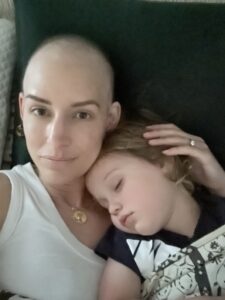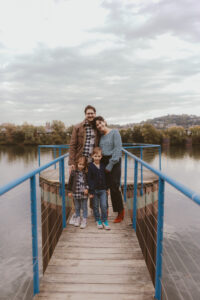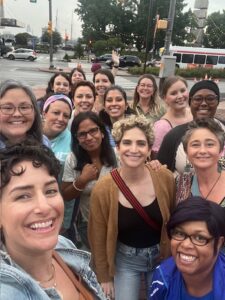 Shannon Gottesman
Shannon Gottesman
PBCC Allegheny County Captain
My diagnosis
It was following my first mammogram after I had turned 40. In January 2023, my mammogram showed nothing. I have extremely dense breasts so my mammo tech recommended an MRI for baseline imaging to compare year-to-year. For some reason, I booked that appointment that same week – mind you, it was a ten-week wait to get it. Meanwhile, I found a lump under my arm. I knew something was not right. It hurt and if I laid on it, I could feel it. I didn’t say too much to anyone but I remember telling my husband and my mom that it does not feel right and my gut is telling me something is off – my intuition really kicked in right away.
My ob/gyn and primary care provider told me I’m likely just a tired mom. They said that since it hurts, and we all have been sick, it’s likely a viral reaction or swollen lymph node and not cancerous, nothing to be worried about.
Fast forward to late March and five hours after the MRI, I recall being in my office when I opened up the results (rookie mistake. As you navigate deeper into cancerland, you learn to never do that). Remember: this was baseline imaging and two physicians told me I had nothing to worry about. I cried in the corner and called my husband and two best friends. Flagged in my results were: Rads 5, multiple red exclamation points and “schedule appointment ASAP.” I had two biopsies done a few days later. My husband picked me up from the cancer center and we drove over to Frick Park where our sons play soccer and sat in total silence staring into nature – silent tears were so loud. And then a day after Passover and on Good Friday, I was aimlessly roaming around TJ Maxx, and I got that call: ‘Shannon, are you somewhere quiet where you can talk and write down a few things? Please grab a pen.’ It was invasive ductal carcinoma (IDC), Stage III. Next we are sitting in my oncologist and surgeon’s office. In a matter of nine days, our world came crashing down.
- Listen to your gut, always, and advocate for yourself.
- If you have dense breasts, book the MRI, even if you need to pay out of pocket or fight your insurance.
The first thing my oncologist said when I met him was, ‘Your mammographer saved your life, and you will never be the same person when you walk out of here today.’ I hope by reading this I can do the same for someone else.
 Fighting cancer as a young mom
Fighting cancer as a young mom
My boys got me out of bed every single day. They were two and just turned five when I was diagnosed. We were quite open with the boys and decided to use the word cancer; we bought a lot of children’s books and explained different phases of treatment, making them feel like they were part of it. They packed my chemo bag every single week with signs, their stuffies and special “treats.” We had a head-shaving party in the cul de sac with friends which they participated in. They baked treats for my nursing and care team and were able to ring the bell with me. I wanted them present so they could see how strong their mama was.
Our oldest, Max, is an empath, very observant and feels everything around him. We knew he would have a lot of questions, and we wanted to be open and honest. We told them mommy is sick and we are going to have do some special medicine and that I might be tired but that I have a great team (and science!) to help me, and that we have family and friends to help us, too. We had a lot of funny moments and laughs.
We also worked closely with their Kindergarten and Pre-K teachers, so we were all aligned. Max did counseling at school, and we were able to take advantage of free services for children at opens in a new windowCancer Bridges. We did our best to keep things as normal as we could and still do things when I felt good. They are the light of my life and while I know it was so hard on them, I am super grateful for their resiliency and tenacity.
On the flip side, there were so many hard moments with the boys. Milestones and celebrations became emotionally taxing. From our wedding anniversary to birthdays and Mother’s Day, I would spiral and obsess about if I would be here for the next one. I missed out on so much: work trips, vacations, Maxwell’s first day of kindergarten and my sister’s 40th. The smallest, most mundane things put me to tears. I would cry putting them to sleep most nights. After I wrapped active treatment during our conference, Max’s teachers shared that he immediately seemed like a different kid – like a weight had been lifted and he wasn’t worrying anymore.

What I learned
It was a wild ride of self-discovery. First and foremost, nothing else mattered. My health did, along with beating this, and that is what I had to keep in mind. Self-care and prioritizing myself were already challenging prior to a cancer diagnosis and then I’m told that I must put myself above all – including my boys, Maxwell and Everett. It was nearly impossible. So much of my life was grinding and hustling. I talk fast, walk fast and work fast. My goals immediately shifted: enduring treatment, slowing down and healing became my focus.
It often felt like whiplash though – one step forward: two steps back. The dichotomy of cancer was always so intriguing. You are given a solid plan but the chemo could damage your heart so now you need an echo, and a bone density scan, and we need to start this endocrine therapy and there will be more when you are done. My anxiety was through the roof and sometimes daily, would unravel to a dark place. I barely slept between the high dosage of steroids paired with worst case scenarios.
I did learn about how important it was to be present, to be here, right now. The small things do not matter – work problems; the belly I started seeing thanks to chemically induced menopause – to be here, with my boys, that’s all that mattered. There were constant ebbs and flows.
I had to dig deeply for the positive and new perspective on life. I had to remind myself how hard this body had to work. Every single cell has had to fight to live. I am grateful to be moving, to be breathing, to be here, in this moment. I learned to admire the strength I am rebuilding and my beautiful, flawed yet courageous, and lovable body.
Lastly, and perhaps most importantly, I learned that I could not keep up with the unsustainable ridiculous pace before cancer. I had to slow down and calm my nervous system, and had to dig really deep to figure out how I could do that, which included a variety of tools from therapy to acupuncture to rediscovering my love for yoga and meditation.
Bright spots
I tried to find joy along the way. Every night at dinner, we would share our favorite part of the day or something that brought us joy to remind us there is still joy around. I wrote a lot and found it to be the most cathartic way to get negative thought patterns out of my head and onto paper.
Hardest challenges
 First, the grieving process; the grieving of old me. I don’t even remember who pre-cancer Shannon was, yet I still don’t recognize the new me. I grieved the fact that I no longer had the option to have any more children. I grieved that I don’t know how I could ever be carefree again – I’ll always have in the back of my mind – what if it comes back. I mourned my old body and my breasts; my hair and brows. I would be so resentful sitting in chemo feeling like the youngest person in the room. So much was taken away. I want to embrace the new me and be proud of my identity as a survivor, yet I hated looking in the mirror – strong, not skinny, I would tell myself on repeat.
First, the grieving process; the grieving of old me. I don’t even remember who pre-cancer Shannon was, yet I still don’t recognize the new me. I grieved the fact that I no longer had the option to have any more children. I grieved that I don’t know how I could ever be carefree again – I’ll always have in the back of my mind – what if it comes back. I mourned my old body and my breasts; my hair and brows. I would be so resentful sitting in chemo feeling like the youngest person in the room. So much was taken away. I want to embrace the new me and be proud of my identity as a survivor, yet I hated looking in the mirror – strong, not skinny, I would tell myself on repeat.
Another challenge was learning to say yes to help. I am stubbornly independent. I worked most of my active treatment as my team and I knew it would be a good distraction (and please note: I had the luxury and option to work from home, which I realize not all do). When I look back at that period, I have no idea how I did that. I started saying yes to the meal train, and the extra hands for the boys, and to help with the work load.
Honestly, to me survivorship is tough. It has almost been more challenging than active treatment – you really need to sit with those feelings and process the trauma you put aside for so long fighting. An important first step is recognizing that mental health matters just as much as physical in the recovery process. My endocrine and hormone therapy has rocked me with a number of side effects and weight gain. I could write an entire book on survivorship.
If you could share one message with a woman who is newly diagnosed, what would you say?
You can do hard things. The road will be windy and bumpy – take it all one day at a time. It’s okay to not be okay, and it’s okay to rest. Figure out what community means to you and lean on that community. I promise you will find a stronger better version of yourself throughout this journey. In addition to taking care of your body, don’t’ neglect your mind and mental health. You got this.
